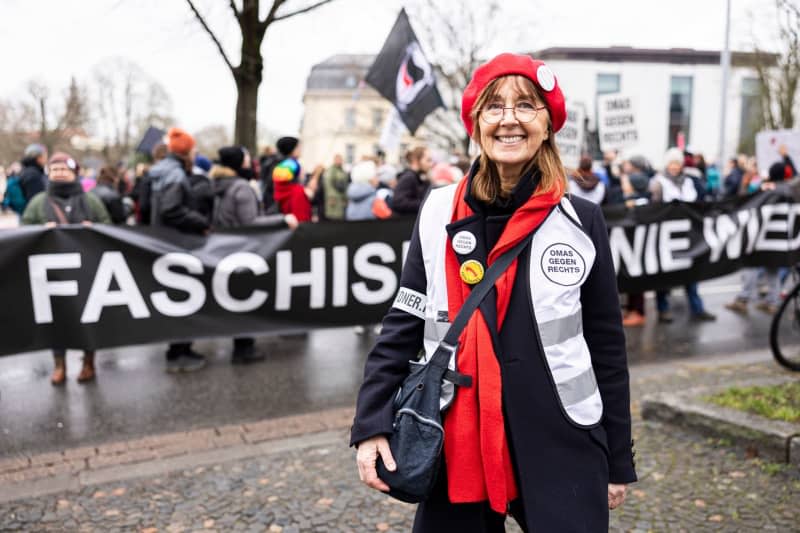Meet the German grannies out campaigning against far-right extremists

- Oops!Something went wrong.Please try again later.
There are more and more older women showing up at demonstrations taking place throughout Germany against the rise of the far right.
Germany has been rocked by the rise of far-right extremism for months, but when an investigative report by outlet Correctiv revealed that members from the far-right Alternative for Germany (AfD) and other parties had attended a meeting where a secret "masterplan" to deport migrants on a large-scale was discussed, something changed and people began to take the streets in growing numbers.
The protests have seen people from across the social and political spectrum unite and take a stance against racism and far-right extremism.
But who are the elderly ladies gathering at rallies from Berlin to Munich, Cologne to Hanover as well as in smaller towns and villages like Leer in the north-west?
Many hold signs saying "GRANDMAS AGAINST THE RIGHT," while others show the slogan on badges, banners or hats they knitted themselves.
They are not the only group of older people to rally around a political cause. From the Madres de Plaza de Mayo in Argentina to the pension protests in Russia in 2018 and the Gray Panthers, who confront ageism and other social justice issues, older people have long been protesting for particular causes.
In Germany, the group unites men and women, some of whom grew up during the Second World War and see it as their duty to warn the younger generation to protect democracy from the facism they witnessed first hand.
Fears about facism have been growing in Germany again recently, not least because of the rising popularity of the far-right AfD.
Grandmas Against the Right says its aim is to oppose a range of related issues, including anti-Semitism, racism and misogyny as well.
"We are a civil society, non-partisan initiative," says the German group's website.
The German branch says it was founded on January 27, 2018, designated International Holocaust Remembrance Day by the United Nations General Assembly.
While the name of the group refers to grandmas, the association is made up of men and women alike.
It is unclear how many people are part of the group, which is largely decentralized.
"In the last three weeks, the number of members in the association has more than quadrupled," says Anna Ohnweiler from Nagold in southern Germany, one of the founders of the movement.
Ohnweiler is a former teacher and social worker who grew up in socialist Romania.
In Germany, many local groups are independent of the association. Ohnweiler estimates that at least 30,000 members come to the demonstrations, while more new groups are still being founded in smaller towns and communities.
In Hanover, Uta Saenger, 70, runs the local Grandmas Against The Right - though there are some middle-aged men and women in the group too.
Saenger considers campaigning against Nazis, misanthropy and anti-Semitism as a full-time job. "I see it as an obligation for our generation to pass on our experiences and warn people," she says.
Petite, sporting a red beret, Saenger describes herself as an "anti-fascist out of decency," inspired by a quote from film star Marlene Dietrich, who emigrated to the US after the Nazis came to power and campaigned against their regime.
The oldest grannies in Saenger's group are almost 90 and still recall bombing raids and trying to escape when they were children,she says.
Of those born after 1945, many were raised by parents who were traumatized by the war and all they had experienced. Few talked about those times.
Education, meanwhile, during the post-war period, was also permeated by right-wing influences, what Saenger calls "brown thoughts" - referring to the brown uniforms worn by the Nazi storm troopers.
"That was so present back then that now you immediately feel it, see it and know when things are going in that direction again," she says.
German mainstream politicians, alarmed by support for the far-right, have been calling on the public for more civic engagement.
The recent countrywide protests erupted after the revelation that members of the far-right Alternative for Germany (AfD), the conservative Christian Democratic Union (CDU) and the ultra-conservative Values Union discussed plans to deport immigrants last year.
At the November meeting, the former head of the far-right, white supremacist Identitarian movement in Austria, Martin Sellner, spoke about expelling foreign nationals from Germany, including asylum seekers and immigrants with German passports, by force if necessary.
The Grandmas Against The Right movement has been practising civic engagement to counter such developments for years.
They protested near AfD election campaign stands and party conferences and held vigils after racist attacks.
They keep battling and warning the public of the danger of the far-right, despite facing online hate and hostility.
You have to be fearless, says Saenger, who once filed a complaint about online hate speech.
"The grannies against the right are definitely a very special breath of fresh air for our democracy," says Lorenz Blumenthaler, spokesman for the Amadeu Antonio Foundation which campaigns against far-right parties, anti-Semitism and racism.
More than one hundred local groups are now campaigning "consistently against far-right extremism, anti-Semitism and racism," the foundation says. "But they are also fighting for climate justice or against conspiracy narratives during the coronavirus pandemic," says Blumenthaler.
Some of women active in the movement have been engaged in politics all their lives, taking to the streets during the student movement at the end of the 1960s or joining the peace and anti-nuclear protests.
Others first attended demonstrations after retiring.
That does not mean they are shy. The women and men gathering at demonstrations shout, whistle and sing songs they create for the rallies.
They can be quiet, too, such as when holding a recent solidarity vigil at a synagogue in Hanover.
Many, looking back on their war time experiences, have turned out to show support for Israel since the Palestinian extremist organization Hamas attacked the country on October 7.
Dozens of grannies have been standing outside the synagogue every Friday evening, some with walking frames, even in the sleet, ever since. "For us, this is sympathy and friendship in action," Saenger said in a brief speech to fellow campaigners.
At a rally in front of 35,000 people in Hanover, Rebecca Seidler, Chairwoman of the State Association of Liberal Jewish Communities in Lower Saxony, addressed the Grandmas Against The Right directly and thanked them "from the bottom of her heart for the sign of solidarity and against all forms of anti-Semitism," for showing up each Friday "in all weathers."
In 2020, the grannies were honoured for their commitment with the Paul Spiegel Prize donated by the Central Council of Jews, though the award was only presented in 2022 due to the pandemic.
In her acceptance speech at the time, co-founder Gerda Smorra from Bremen said that the grannies' forms of action were diverse.
They are not only active on the streets against far-right extremism, but also in schools, adult education centres, retirement homes and youth centres, she said.
"Grannies are old, but thanks to their life experience, they are diverse - and loud!"



